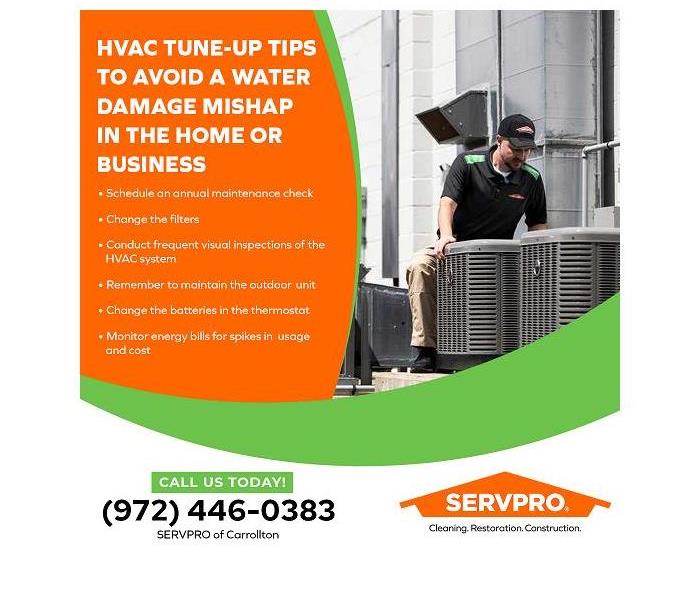Cleaning and Maintenance Tips to Keep HVAC Units Operating at Peak Efficiency
9/7/2022 (Permalink)
Blog Summary: SERVPRO of Carrollton highlights HVAC maintenance tips to avoid a water damage and mold damage disaster in the home.
SERVPRO® Carrollton provides damage restoration services including water removal and water damage restoration for businesses. These services are vital for property owners who have suffered a water damage disaster from an HVAC system malfunction.
HVAC Tune-up tips to avoid a water damage mishap in the home or business
Nearly half of home energy consumption is dedicated to heating and cooling the home. With energy prices skyrocketing at the pump and at the meter, the HVAC system is a great place to start achieving the greatest savings. HVAC maintenance can also extend the life of the system, which would cost thousands to replace.
Tip #1: Schedule an annual maintenance check.
An HVAC system is more efficient and lasts longer when well maintained. At a minimum, schedule at least one inspection per year. If the system runs hard during the summer, consider a second inspection to prepare the unit for the winter months. The system might not be stressed as much during the winter if a home has supportive heating sources from a wood stove, fireplace, or gas space heater. Without reservation, prepare the unit for the hot Texas summers by having a reputable and licensed HVAC service company thoroughly inspect the unit. A reputable company will have a well-defined, item-by-item inspection check sheet. The list should include the tasks listed below.
- Inspect and tighten loose electrical connections.
- Lubricate moving parts and replace any worn bearings and belts.
- Clean the condensate pan and drain and check for rust, cracks, sludge, and leaks.
- Check the system controls and validate the thermostat calibration and settings.
- Clean blower components and adjust where needed.
- Inspect for corrosion and leaks while cleaning the evaporator and condenser coils.
- Check the refrigerant charge and report findings to the client.
- Check fuel line connections.
- Inspect the gas pressure, heat exchanger, and burner combustion.
Tip #2: Change the filters.
Filters remove hair, dust, and other pollutants from the air. A dirty filter restricts airflow, increases the load on the system, and shortens the life of the unit. By using better quality stand-alone air purifiers throughout the home, the homeowner can remove the vast majority of hair, dust, dirt, dander, and allergens from the air. Restrictive filters on the HVAC system strain the system and reduce cooling and heating capacity. Use the HVAC system to heat and cool the home, and use highly-energy efficient air purifiers with HEPA filters to keep the air clean. HVAC filters that allow a freer flow of air through the unit are less expensive and can be changed less frequently, thus saving money, increasing efficiency, and extending the life of the HVAC system.
Tip #3: Conduct frequent visual inspections of the HVAC system.
When changing the filter, inspect the unit and listen to it run with the filter off. Watch for signs of water damage, and give the system the “sniff test” for mold, mildew, and any other foul or unusual smells. Look at the thermostat to see if the batteries need changing. Inspect the area where the condensate drain evacuates moisture from the unit. Make sure debris and dirt have not clogged the end of the pipe. If the end of the pipe has been damaged, remove or replace the broken section. Registers and returns should be open and unimpeded by furniture, clutter, or debris. If needed, level the outdoor unit with plastic shims.
Tip #4: Remember to maintain the outdoor unit.
Keep the area around the unit free of debris, brush, and plants. After severe weather, inspect the unit for damage. Remove any debris build-up near the unit.
Tip #5: Change the batteries in the thermostat.
HVAC thermostat batteries should be replaced at least once a year. Smoke detectors and carbon monoxide detectors are an absolute necessity in a home with a combustion-based heating system. The batteries in these safety devices should be changed twice a year. Consider replacing smoke alarms and CO detectors every 7 to 10 years per the manufacturer’s specifications.
Tip #6: Monitor energy bills for spikes in usage and cost.
Keep an eye on the energy bill. A spike could indicate that filters are clogged, ducts are leaking air, the refrigerant is low, or a part may be failing or malfunctioning.
Failure to maintain the HVAC system can not only strain the budget but can also lead to serious water damage. An HVAC system can produce anywhere from five to twenty gallons of water per day. A damaged condensate pan or clogged condensate drain can deposit this water either onto the floor or into the attic, depending on the location of the inside unit. This much water can cause a significant amount of damage in a short amount of time. Once a problem is spotted, the cause needs to be addressed, and the damaged area needs to be dried, cleaned up, and restored. Delay can affect insurance claims payout and allow advanced secondary damage to occur, including a mold infestation.
In the event of water damage from an HVAC system or other water intrusion, trust the restoration experts at SERVPRO of Carrollton for water removal and water damage restoration. They offer twenty-four-hour emergency service, 365 days a year. Highly trained restoration technicians arrive on the scene in about an hour. The company is locally owned and operated.
For more information about commercial restoration services in Carrollton, TX, contact the SERVPRO of Carrollton office by phone at (972) 446-0383 or by email at office@SERVPRO10952.com





 24/7 Emergency Service
24/7 Emergency Service
